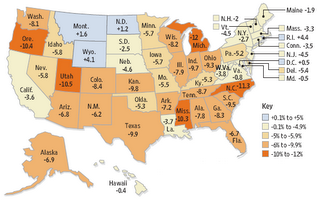How we have fallen

Most people may be aware that productivity has steadily increased over the last half century or so. In 1960 for example, the productivity index was just half what it is now.
But did you know that wages have steadily fallen since the early 1970s? In 1973 for example, real wages were $15.73 and in 2000 they were just $14.15 (per hour, in 2001 dollars).
The map above shows how incomes have dropped over the last six years, state by state. Only four states saw an increase, and some states saw drops as large as 12% in just six years.
In David Harvey's new book (A Brief History of Neoliberalism) he accounts for this with the so-called "Volcker shock." Paul Volcker was Chairman of the Federal Reserve Bank under President Carter and Reagan, and it was during the 1970s that the neoliberal policies of Margaret Thatcher and Ronald Reagan began to assume prominance. Volcker radically raised interest rates. New Deal policies of full employment were dropped in favor of anti-inflationary policies, paid for with high interest rates.
Couple this with the deregulation that Reagan pursued (breaking the unions who had previously protected workers' income) and you've got the explanation. For example, the minimum wage was on a par with the poverty level in 1980 but was 30% below it in 1990 (it was last raised in 1996).
Those are some of Harvey's arguments. It's a very good (and brief) introduction to the shift to neoliberalism we have experienced in the US and UK, not to mention neoliberal trends in China and South America. It does leave one wondering how neoliberalism might be combatted or countered, though.
No comments:
Post a Comment